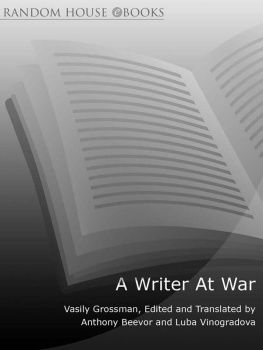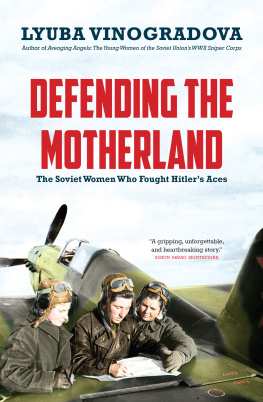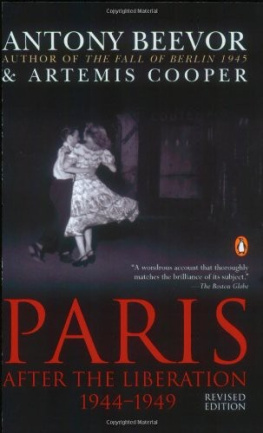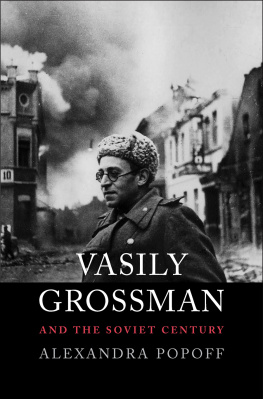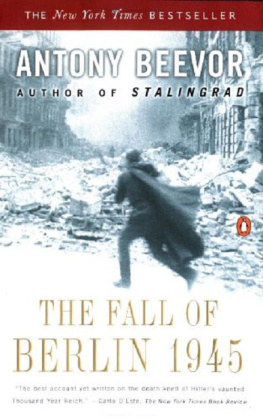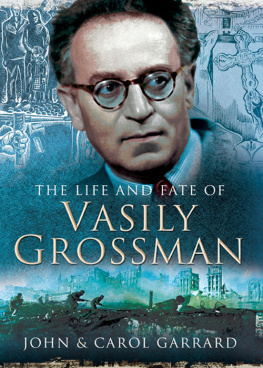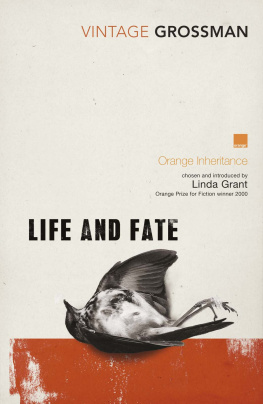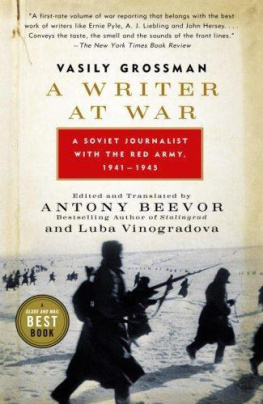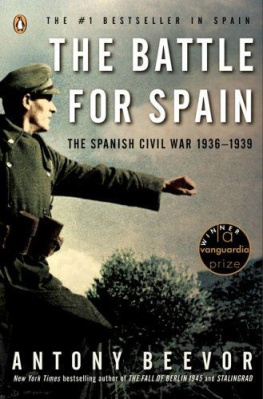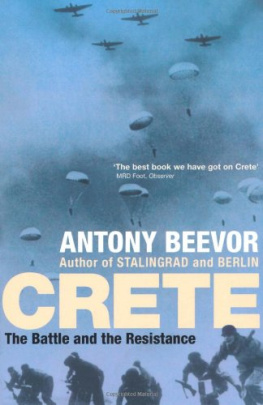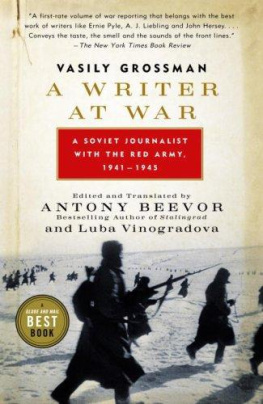Beevor Antony - A Writer At War: Vasily Grossman with the Red Army 1941-1945
Here you can read online Beevor Antony - A Writer At War: Vasily Grossman with the Red Army 1941-1945 full text of the book (entire story) in english for free. Download pdf and epub, get meaning, cover and reviews about this ebook. City: London, year: 2010, publisher: Random House Group Limited;Vintage Digital, genre: Non-fiction. Description of the work, (preface) as well as reviews are available. Best literature library LitArk.com created for fans of good reading and offers a wide selection of genres:
Romance novel
Science fiction
Adventure
Detective
Science
History
Home and family
Prose
Art
Politics
Computer
Non-fiction
Religion
Business
Children
Humor
Choose a favorite category and find really read worthwhile books. Enjoy immersion in the world of imagination, feel the emotions of the characters or learn something new for yourself, make an fascinating discovery.
- Book:A Writer At War: Vasily Grossman with the Red Army 1941-1945
- Author:
- Publisher:Random House Group Limited;Vintage Digital
- Genre:
- Year:2010
- City:London
- Rating:3 / 5
- Favourites:Add to favourites
- Your mark:
- 60
- 1
- 2
- 3
- 4
- 5
A Writer At War: Vasily Grossman with the Red Army 1941-1945: summary, description and annotation
We offer to read an annotation, description, summary or preface (depends on what the author of the book "A Writer At War: Vasily Grossman with the Red Army 1941-1945" wrote himself). If you haven't found the necessary information about the book — write in the comments, we will try to find it.
A Writer At War: Vasily Grossman with the Red Army 1941-1945 — read online for free the complete book (whole text) full work
Below is the text of the book, divided by pages. System saving the place of the last page read, allows you to conveniently read the book "A Writer At War: Vasily Grossman with the Red Army 1941-1945" online for free, without having to search again every time where you left off. Put a bookmark, and you can go to the page where you finished reading at any time.
Font size:
Interval:
Bookmark:

Vasily Grossman with the Red Army
19411945
EDITED AND TRANSLATED
BY
Antony Beevor
AND
Luba Vinogradova

THE HARVILL PRESS
LONDON
This eBook is copyright material and must not be copied, reproduced, transferred, distributed, leased, licensed or publicly performed or used in any way except as specifically permitted in writing by the publishers, as allowed under the terms and conditions under which it was purchased or as strictly permitted by applicable copyright law. Any unauthorised distribution or use of this text may be a direct infringement of the authors and publishers rights and those responsible may be liable in law accordingly.
Version 1.0
Epub ISBN 9781407092010
www.randomhouse.co.uk
Published by The Harvill Press 2005
2 4 6 8 10 9 7 5 3 1
Copyright Ekaterina Vasilievna Korotkova-Grossman and Elena Fedorovna Kozhichkina 2005
English translation, introduction, and commentary Antony Beevor and Luba Vinogradova
The moral right of Vasily Grossman to be identified as the author of this work has been asserted under the Copyright, Designs and Patents Act 1988
This book is sold subject to the condition that it shall not, by way of trade or otherwise, be lent, resold, hired out, or otherwise circulated without the publishers prior consent in any form of binding or cover other than that in which it is published and without a similar condition including this condition being imposed on the subsequent purchaser
First published in Great Britain in 2005 by The Harvill Press Random House, 20 Vauxhall Bridge Road, London sw1v 2sa
Random House Australia (Pty) Limited 20 Alfred Street, Milsons Point, Sydney, New South Wales 2061, Australia
Random House New Zealand Limited 18 Poland Road, Glenfield, Auckland 10, New Zealand
Random House (Pty) Limited Endulini, 5A Jubilee Road, Parktown 2193, South Africa
The Random House Group Limited Reg. No. 954009 www.randomhouse.co.uk
A CIP catalogue record for this book is available from the British Library
ISBN 1 84343055 x
Papers used by Random House are natural, recyclable products made from wood grown in sustainable forests; the manufacturing processes conform to the environmental regulations of the country of origin
Designed by Peter Ward Maps by Paul Simmons
Typeset by Palimpsest Book Production Limited Printed and bound in Great Britain by Clays Ltd, St Ives plc
PART ONE
The Shock of Invasion 1941
PART TWO
The Year of Stalingrad 1942
PART THREE
Recovering the Occupied Territories 1943
PART FOUR
From the Dnepr to the Vistula 1944
PART FIVE
Amid the Ruins of the Nazi World 1945
Also by Vasily Grossman in English
LIFE AND FATE
FOREVER FLOWING
Vasily Grossmans place in the history of world literature is assured by his masterpiece Life and Fate, one of the greatest Russian novels of the twentieth century. Some critics even rate it more highly than Pasternaks Doctor Zhivago or the novels of Solzhenitsyn.
This volume is based on his wartime notebooks, but also some essays which are all in the Russian State Archive for Literature and the Arts (RGALI). We have also included some letters in the possession of his daughter and step-son. The notebooks reveal a good deal of the raw material which he accumulated for his novels as well as his articles. Grossman, a special correspondent for the Red Army newspaper, Krasnaya Zvezda, or Red Star, proved to be the most perceptive and honest eyewitness of the Soviet frontlines between 1941 and 1945. He spent more than a thousand days at the front nearly three out of the four years of war. The sharpness of his observation and the humanity of his understanding offer an invaluable lesson for any writer and historian.
Vasily Grossman was born in the Ukrainian town of Berdichev on 12 December 1905. Berdichev had one of the largest Jewish populations in central Europe and the Grossmans were part of its educated elite. Vasily had been given the name of Iosif, but like many assimilated families, the Grossmans russified their names. His father, born Solomon Iosifovich, had changed his to Semyon Osipovich.
Grossmans parents separated and, as a young boy, he lived in Switzerland for two years with his mother before the First World War. In 1918, just after the revolution, he was back in Berdichev. The Ukraine and its rich agriculture was destroyed first by Field Marshal von Eichhorns German occupation, which stripped the countryside.sides. Whites and nationalists, and in some cases Red Guards, vented their blind hatred with pogroms across the Ukraine. Some say that around 150,000 Jews, roughly a third of the Jewish population, were murdered during the civil war. Famine followed between 1920 and 1922, with hundreds of thousands of deaths in the Ukraine alone.
Grossman went to Moscow University in 1923 where he studied chemistry. Even at that early stage, the unmilitary Grossman demonstrated a fascination for the army. was a completely civilian person, said his only child, Ekaterina Korotkova-Grossman. One could see this immediately from the way he stooped and the way he wore his glasses. And his hands were so clumsy. [Yet] he first showed an interest in the army when he was still a student. He wrote in one letter that if he was not called up he would volunteer.
In 1928, when only twenty-three and still a student, he married his girlfriend in Kiev, Anna Petrovna Matsuk, known as Galya. This relationship produced a daughter in January 1930. They called her Ekaterina, or Katya, after Grossmans mother. In 1932, ten years after the civil war, an even worse man-made famine, provoked by Stalins campaign against the kulaks and the forced collectivisation of agriculture, killed over seven million people.. If Grossman did not witness the worst horrors of the famine, he certainly heard of them or saw the results, as skeletal figures begged beside railway tracks in the hope of a generous traveller throwing them a crust. He described this Ukrainian famine in his last novel, Forever Flowing, including the execution of a woman accused of eating her two children.
The consequence of Stalins cruel treatment of the region, as Grossman himself was to discover, would be the widespread Ukrainian welcome to invading German forces a decade later. Stalinist agents are said to have spread the rumour that the Jews were responsible for the famine. This may well have been a factor later in the Ukrainians enthusiastic aid to the Germans in their massacres of the Jews.
Grossmans marriage, frequently interrupted by his absence in Moscow, did not last long. Galya had left their daughter with his mother, because Kiev was the epicentre of the famine and the child stood a far better chance of survival in Berdichev. Over the following years, Katya often returned to stay with Grossmans mother.
Writing started to interest Grossman rather more than his scientific studies, but he needed a job. On his eventual graduation, he went in 1930 to work at Stalino (now Donetsk) in the eastern Ukraine as an engineer in a mine. The Donbass, the area enclosed by the sharp curve of the lower Don and Donets, was a region he came to know again during the war, as the notebooks show. In 1932, Grossman, exploiting a misdiagnosis which listed him as chronically tubercular, managed to leave Stalino and move back to Moscow. There, he published his first novel, Glck auf! (Good luck!
Font size:
Interval:
Bookmark:
Similar books «A Writer At War: Vasily Grossman with the Red Army 1941-1945»
Look at similar books to A Writer At War: Vasily Grossman with the Red Army 1941-1945. We have selected literature similar in name and meaning in the hope of providing readers with more options to find new, interesting, not yet read works.
Discussion, reviews of the book A Writer At War: Vasily Grossman with the Red Army 1941-1945 and just readers' own opinions. Leave your comments, write what you think about the work, its meaning or the main characters. Specify what exactly you liked and what you didn't like, and why you think so.

